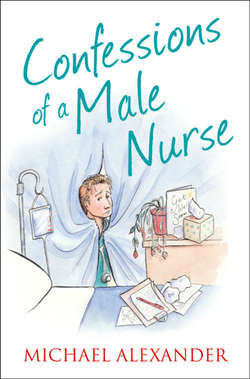Читать книгу Confessions of a Male Nurse - Michael Alexander - Страница 8
ОглавлениеIntroduction
There is one thing almost all of us are going to be at some point, and that is a patient. One day, most of us are going to need to depend on someone when we are at our weakest. That someone is most likely going to be a stranger and that stranger is most likely to be a nurse.
I have worked with patients suffering from dreadful diseases, some of which I had never even imagined, let alone dealt with, like Guillain-Barré syndrome or motor neurone disease, or horrific cancers that spread through the body. Now, after 16 years, I’ve done pretty much everything – from keeping someone comfortable while their body is failing and the pain is getting too much to cope with, to chasing a confused (and very naked) patient down a corridor. I’ve learnt how to deal with a family who have been told their loved one is not going to make it (which never gets any easier, regardless of whether it is expected or not). I’ve experienced my fair share of emotions: frustration, impotence, despair, at the unfair ways disease and misfortune can strike those most deserving of life; at other times, relief when someone’s suffering ends.
But no matter how much I sympathise, I don’t really know what it is like to be a patient. I have only seen things from a nurse’s perspective, where you can’t afford to get too emotional or involved. I often wonder what it must be like to be on the other side, to be lying in bed, to see things through a patient’s eyes.
The only way I have of imagining is to use my experience of the way people in the past have reacted to being in my care.
What I have noticed, is that a person’s behaviour generally changes as soon as they become a patient. Some people become extremely nervous, which is understandable, and may explain why some pretty silly questions are asked. Does surgery mean I will have to have an operation? Then, there are the people who, during a ward round with their consultant, will nod as if in understanding, but when the doctor leaves they haven’t the faintest idea what is going on. I’ve heard many a patient, when asked by their consultant, ‘How do you feel?’ respond by saying that they feel fine, when in fact they’d spent the morning complaining about their ailments.
Some people suddenly find they are unable to do simple tasks for themselves, like pour their own water or fluff their own pillows, even if they are physically quite capable. Others become so used to being in hospital that they know how a ward runs better than some of the staff. Some become so demanding that no matter how many of their requests are satisfied, they will never be happy, while others are so grateful for any small service – even just spending five minutes listening to them – that they want to shake your hand or marry you off to one of their grandchildren. I’ve seen people too afraid to disturb the nurse, as they don’t want to be a burden, even though they are worried about the pain in their chest. I’ve seen others treating nurses like servants. Then there are people who lose all initiative, because they aren’t sure what they are supposed to do; they don’t know how to be a patient and they’re not sure what exactly a nurse’s role is.
When I picture myself sitting for hours in the waiting room, seeing patients who came after me being dealt with first, I wonder whether this would irritate me, or whether I’d be calm and rational, like all nurses want their patients to be. Then when I finally get called through to see the doctor, I imagine expecting the doctor to have all the answers to my problems as, ‘Doctor knows best.’
It must be frightening for patients who are admitted to be put on a drip, to have blood taken every day, or tubes stuck in some surprising places. For some having to share a room with a bunch of sick strangers might seem difficult.
But that’s why I’m here, your average nurse. It isn’t just about giving you your medicines and dressing your wounds. I’m here to explain things, including the foreign language the doctors use. I’m here to help you in and out of bed, to help you help yourself. I’m here to help calm you in the night when you wake up wondering where you are, or worrying about that pain in your chest. I’m here to help make your treatment as bearable as possible.
